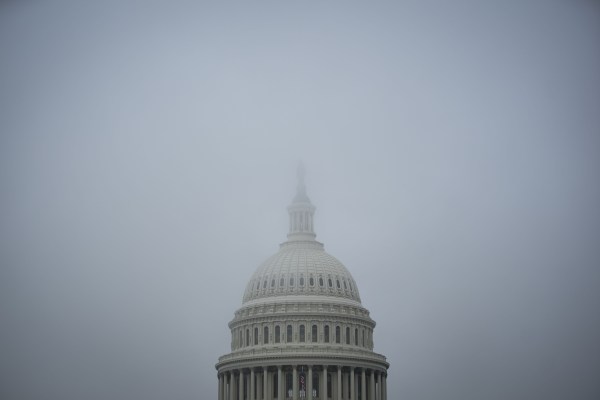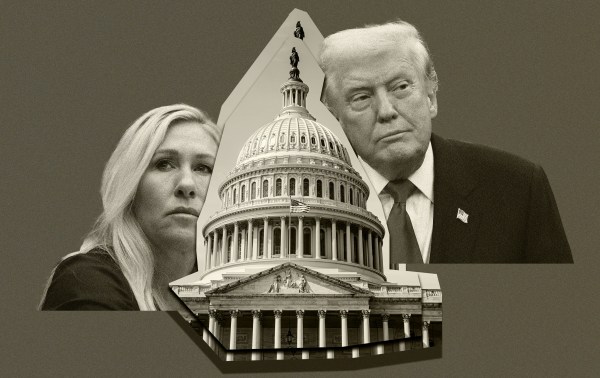Turn any article into a podcast. Upgrade now to start listening.
Premium Members can share articles with friends & family to bypass the paywall.
Being a pleonast means spending a few thousand words on a subject that can be explained by a bar graph at a glance.
Why have Democrats, traditionally the anti-shutdown party, forced a government shutdown? What do they hope to gain from it? What does the endgame look like?
Here’s the answer to those questions. If you want to skip the rest of this piece, feel free.
Talking Points Memo editor and fellow pleonast Josh Marshall elaborated on the rationale for a shutdown in a piece titled “Let It Happen.” Democrats “need to show there is an opposition out there willing to fight the imposition of a presidential autocracy,” he wrote. “If they’re not, who else will have the courage or inclination to take any risks and fight? An opposition requires morale to remain in the fight and endure while its opponents are holding most of the power.”
Three sentences, three uses of the word “fight,” zero mentions of a realistic policy goal. To repeat what I said in March, the last time Democrats considered doing something like this: I’ve seen this movie before. And it sucked.
A message from The Dispatch
Stay Ahead of the Curve With Dispatch Energy
The Dispatch’s newest weekly newsletter will dive into the politics, policy, and innovation shaping America’s energy future, presented by Pacific Legal Foundation. Featuring a rotating roster of contributors who are experts in their respective fields, each edition will feature incisive analysis on everything from oil and gas and permitting regulations, to renewables, climate, and the grid.
As a non-paying reader, you are receiving a truncated version of Boiling Frogs. You can read Nick's full newsletter by becoming a member here.
The fight that the two parties are about to have is based on false pretenses, in fact. Democrats are doubtless sincere in demanding that Republicans extend federal subsidies for Obamacare insurance plans and roll back the cuts to Medicaid made under the One Big Beautiful Bill Act, but health care policy isn’t why so many leftists are clamoring for obstructionism.
They’re clamoring for it because they want to punch the fascist bully in the nose. They’re scared and demoralized by America’s turn towards authoritarianism, as they should be, and are frantic to exert what little power they still have in Washington to stop Donald Trump from getting his way once again. They’ve chosen to frame the fight in terms of health care rather than creeping Caesarism because they’ve digested the grim lesson of the 2024 election, that modern Americans don’t care about democracy. They care only about their own bottom lines.
The coming battle over health care is a test to see if the minority power retains any leverage whatsoever over the direction of a country that looks more third-world every day.
What I can’t figure out is what would need to happen for Democrats to believe that they passed that test. What does winning this “fight” look like? What sequence of events would have to unfold for liberals to say a few weeks from now, “That was absolutely worth doing”?
The bad news for liberals is that I can’t come up with a solid answer. The good news is that it almost certainly doesn’t matter. Goldfish-brained voters don’t care about shutdowns.
Risks.
The first problem for Democrats in trying to win the battle for public opinion is that, for once, they’re the ones who are taking hostages in hopes of obtaining a ransom.
The side that favors a so-called “clean” continuing resolution to fund the government has an irresistible argument in its favor, that it simply wants to maintain the level of spending that the two parties previously agreed to. Traditionally that’s been Democrats; now, implausibly, the renegade Trump-era GOP has been thrust into defending the status quo.
It’s hard to convince voters who care only about their own bottom lines to support a major disruption in government services that will affect their bottom lines. And it’s hard to convince the governing party to compromise when it has a compelling political incentive not to: If it rewards hostage-taking by the minority, that tactic will obviously be used again later to try to extract further concessions.
Republicans tried repeatedly during the Tea Party era to secure lasting, meaningful spending reforms from Democrats by defunding the government. They failed. There’s a lesson there about how likely Chuck Schumer and Hakeem Jeffries are to get Trump, a figure who lives in terror of being seen as weak, to cave now.
The second problem is that Schumer is playing a weak hand.
Yesterday, before the shutdown even began, three members of his caucus switched sides and voted with Republicans to keep the government open—Angus King of Maine, Catherine Cortez Masto of Nevada, and John Fetterman of Pennsylvania. (Fetterman has embraced the “maverick” brand so tightly that he may be the only person in Congress on either side who’s pleased with Trump’s trade war.) If Democratic unity is already fracturing on day one, it’s reasonable to wonder if Schumer can prevent a mutiny among his moderates that ends the shutdown prematurely. Even if he can, Democrats now face having prominent figures in their own party arguing the GOP’s case for passing a clean CR.
To make matters worse, Russell Vought is poised to make this hurt.
Vought is the head of the Office of Management and Budget, the arm of the White House responsible for deciding how federal agencies should operate when funding runs out. Normally OMB would be looking for ways to reduce the pain of a shutdown for Americans, but Vought is an authoritarian fanatic (he wants a veto over Congress’ power of the purse, for instance), and like all authoritarian fanatics he revels in ruthlessness. His ruthless solution to Democratic hostage-taking is to take hostages of his own: He’s threatening to use the shutdown as a pretext to fire thousands of federal workers, perhaps beginning as soon as tomorrow, to continue the work of Elon Musk and DOGE at the start of Trump’s presidency.
If Vought follows through, Americans might blame him and the president for the bloodletting—or they might blame Schumer and the Democrats, the party that triggered the shutdown, for creating the circumstances that made it possible. How steadfast do we think moderate Senate Dems will remain once panicked federal employees are dialing up their offices en masse, begging them to make a deal before they’re canned? Will America be better or worse off once Vought and Trump begin replacing career civil servants with likeminded authoritarian fanatics recruited from the MAGA bench?
You might interject at this point to say, à la Josh Marshall, that all of this is beside the point. Everyone understands that Democrats won’t have their demands met. The shutdown needs to happen anyway simply to show the liberal base that its leaders are willing to put up a fight. It’s a morale-building exercise at a moment when left-wing morale is about as low as it can realistically be.
Is it? Let’s think this through.
Morale.
Do you think liberal morale will improve if eight Senate Democrats end up knuckling under to Vought’s threats and voting with Republicans to end the shutdown?
If this is a test of whether the minority party in Washington can muster a meaningful stand against authoritarianism, it’s hard to imagine a more spectacularly demoralizing failure than that.
It’s hard to imagine any outcome that doesn’t further anger the base, in fact—another lesson we all should have learned from the right’s Tea Party era. I suspect former congressional staffer Matt Glassman is right in expecting a relatively short shutdown that ends with “handshake assurances” between Schumer and Republicans that the parties will negotiate an extension of Obamacare subsidies after the government reopens. And I suspect I’m right that liberals will lose their minds when that happens, accusing Schumer of having forfeited his leverage in exchange for nothing more than a gentlemen’s agreement with a movement that no longer contains any gentlemen.
The only way to impress one’s base in a “fight for fight’s sake” standoff like this one is to force the other side to capitulate totally, a near-impossibility. And here’s an interesting quirk of the current shutdown: Even if the president did capitulate totally, that still might not do much good for left-wing morale long-term.
Democrats have reportedly identified Trump himself as the potential weak link in the GOP’s united shutdown front, and for good reason. Yes, granted, the president won’t want to look soft, but there’s nothing he loves more than a deal. He’s also been known to get squeamish about his positions as the economic stakes rise, which they will if the shutdown drags on. And he’s allegedly “obsessed” with retaining control of Congress in next year’s midterms, enough so to have egged on an unprecedented mid-decade redistricting effort in red states.
All of that being so, if you’re Donald Trump, would it be the worst thing in the world to give in to Schumer’s demands?
Unlike more traditional conservatives like Senator Majority Leader John Thune and House Speaker Mike Johnson, the president doesn’t care about federal spending. He knows that Democrats are planning to run on health care next fall, knows that voters who lose their Obamacare subsidies will be furious at him, and presumably knows that polling on the One Big Beautiful Bill Act is terrible. Schumer is essentially inviting him to solve those problems and take the left’s most potent issue off the table. Why shouldn’t he accept?
Republicans have such a strong incentive to make a deal on health care before the midterms, argues Ed Kilgore at New York magazine, that Democrats don’t actually need to twist their arms over it by forcing a shutdown. “Why not just keep the government open and negotiate with Trump on their one realizable goal [i.e. extending Obamacare subsidies],” he wonders, “knowing that if a deal doesn’t happen the president and his party will totally get blamed for the premium spikes?”
The solution to the liberal morale problems can’t be to throw the White House into a political briar patch. Democratic voters won’t be gratified by a “win” that leaves Trump functionally in a stronger political position and does nothing to achieve the submerged goal of this fight, dealing a blow to authoritarianism. There will be nothing left of left-wing morale in 2027 if the outcome here helps the GOP hold onto its majorities in the House and Senate next fall.
There might not be much left in a month, frankly, if Republicans’ talking point about Democrats fighting to provide “health care for illegal immigrants” catches on with swing voters. No one seems to know what they mean by that (coverage for DREAMers? “Emergency Medicaid” for ER visits?) but outlets like Fox News are hammering it hard enough that I’ve had MAGA-friendly relatives repeat the claim to me verbatim in conversation. Presumably it means nothing: It’s just something that a demagogic nationalist party says to encourage suspicions that Democrats care more about foreigners than they do about Americans.
But that doesn’t mean it won’t work. Imagine the state of left-wing morale if this shutdown ends with most Americans siding with Republicans because they’re convinced that sombrero-wearing Hakeem Jeffries couldn’t bear the thought of illegals losing taxpayer-funded Obamacare subsidies that they’re not actually receiving.
Still, there is some good news for the left in all this.
Goldfish brain.
The first bit of good news is that Democrats could plausibly win this fight, if by “win” we mean earn a greater share of public support than Republicans. Already some surveys show Americans more likely to blame Trump’s party than Schumer’s for a shutdown. A New York Times poll that found 65 percent of respondents opposed to Democrats shutting down the government nonetheless found independents twice as likely to blame Republicans for a shutdown.
Wherever the numbers land, though, it’s unlikely that either side will gain a decisive advantage over the other. (One nonpartisan poll this week saw 35 percent blaming the White House or Republicans for a shutdown versus 34 percent who blamed Democrats.) And without a decisive advantage, it’s hard to see how this will matter in a month, let alone a year.
The second bit of good news is that Americans don’t care about shutdowns. That is to say, even if this one goes sideways for Democrats, Chuck Schumer’s party probably won’t pay a price at the polls.
Again we find precedents in the Tea Party era. There was no more quixotic shutdown than the one Ted Cruz led in 2013 to try to block Obamacare from taking effect, and Cruz’s party suffered for it—or so it seemed. A year later, Republicans obliterated Democrats in the midterm elections and gained nine seats in the Senate.
If voters were too goldfish-brained to remember the 2013 stunt in 2014, they’re really unlikely to remember the Democrats’ current stunt next November given the pace of America’s third-world devolution. You read this newsletter every day; you know how much gonzo postliberal derangement this country has endured since January and will yet endure over the next 13 months. By next fall, we’re more likely to be talking about Trump trying to get the military to nuke Portland than we are the political merits of Chuck Schumer’s distant shutdown gambit.
Which brings us to the last piece of good news for lefties. This episode is unlikely to increase their party’s leverage over Trump, but it certainly could increase progressive leverage over the party.
That’s because liberals have lost confidence in their leadership. Asked if their party has strong leaders, 80 percent of Republicans say so compared to just 35 percent of Democrats. Only 21 percent of Republicans think their party needs major changes; 57 percent of Democrats say so of their own side by comparison.
For various reasons ranging from weakness on law-and-order issues to status-quo biases to passivity towards Trump’s constitutional assault to growing hostility to Israel on the left, popular esteem for the Democratic establishment has collapsed. One new poll found 59 percent of Democrats now disapprove of how their party’s leaders in Congress are handling their jobs; in 2014, at the height of Tea Party fever on the right and on the eve of Trumpism, a nearly identical percentage of Republicans said the same about the GOP’s congressional leadership.
Like House Speaker John Boehner in 2013, Chuck Schumer is moving forward with a shutdown that he almost certainly believes won’t succeed because he fears the intense anti-establishment mood among his base and is hoping to mollify them. By giving rank-and-file Democrats what they want, he aims to show them that they don’t need new leadership. Their current leaders can and will do their representative duty by “fighting” when the grassroots insists.
And like John Boehner before him, it will almost certainly blow up in his face.
When Schumer fails to win meaningful concessions, those same grassroots Democrats will cite it as proof that the party desperately needs new leaders who’ll fight hard and enthusiastically, without needing to be browbeaten into doing so. The Republican establishment spent most of Barack Obama’s two terms picking fights with the then-president to appease their own grassroots, without much to show for it; in 2016 their voters punished them for that failure by handing the party to a postliberal goblin who’s set about trying to dismantle everything that traditional conservatives ever believed in.
You can’t win a legislative “fight” in which the unconditional surrender of one’s political enemies is the only victory that’s acceptable to your base, but you can—and will—be faulted for losing it. Boehner and Mitch McConnell learned that lesson the hard way. I expect Chuck Schumer and Hakeem Jeffries will too.








Please note that we at The Dispatch hold ourselves, our work, and our commenters to a higher standard than other places on the internet. We welcome comments that foster genuine debate or discussion—including comments critical of us or our work—but responses that include ad hominem attacks on fellow Dispatch members or are intended to stoke fear and anger may be moderated.
With your membership, you only have the ability to comment on The Morning Dispatch articles. Consider upgrading to join the conversation everywhere.